The Week Ahead
This will not be short; my apologies. It’s one of those weeks!
As we head into the first “real” day of Donald Trump’s first criminal trial tomorrow, keep in mind that among Judge Juan Merchan’s overarching concerns will be protecting the integrity of any convictions obtained in his courtroom so that they will not be reversed on appeal. Trial judges don’t like being reversed in the most ordinary of cases, and this one is far from ordinary.
So far, we’ve seen him rule straight up the middle of pretrial issues and get affirmed by New York’s intermediate appellate court. This will be an important ongoing concern for the Judge. His job is to call the balls and strikes, protecting the defendant’s rights while permitting the government to put on its case. Admission of evidence is left to the discretion of the trial judge so long as he doesn’t abuse it. Judge Merchan has already made preliminary rulings on admissibility that we discussed last week, for instance, that Stormy Daniels can testify and the “catch and kill” scheme can be explored. He balances the importance of the evidence to the District Attorney’s case against the risk of undue prejudice when he makes each ruling. That concern will animate his decisions on the Sandoval issues, which he has said we can expect on Monday. Making sure his order will stand up on appeal will also be top of mind Tuesday when the Judge rules on whether Trump violated the gag order and, if so, how it should be enforced. In that regard, it seems as though someone may have managed to put the fear of God into Trump, because although he is still posting crazy stuff, he canceled his North Carolina rally (bad weather was the excuse) and has avoided, at least as of this writing, attacking witnesses, jurors, and court personnel on Truth Social.
By the end of the day in court on Friday, it was clear that Judge Merchan had had enough as Trump’s lawyers tried to convince him to take up largely repetitive motions asking for do-overs on rulings the Judge had already made against him. Merchan told them, "We're going to have opening statements on Monday morning. This trial is starting." It looks like it’s really happening.
It’s been just over a year since this case was indicted. Remember this post from Trump, who was the one who announced the case to the public?
The indictment charged Trump with 34 felony counts of falsifying business records. Read it here. The DA must prove the following elements for each count:
an intent to defraud
that includes the intent to commit another crime or to aid or conceal the commission of that other crime
and that they did one of the following:
make or cause a false entry in an enterprise’s business records
alter, erase, delete, etc., a correct entry in the records
omit to make a true entry in violation of a legal duty the person knows they have
prevent a true entry from being made or causing an omission
The indictment in this case is pretty bare-bones, but the prosecution also filed a statement of facts, which is why we know as much as we do about how they intend to prove their case. You can re-read it here if it’s been a while. Here’s the key point:
“From August 2015 to December 2017, the Defendant orchestrated a scheme with others to influence the 2016 presidential election by identifying and purchasing negative information about him to suppress its publication and benefit the Defendant’s electoral prospects. In order to execute the unlawful scheme, the participants violated election laws and made and caused false entries in the business records of various entities in New York. The participants also took steps that mischaracterized, for tax purposes, the true nature of the payments made in furtherance of the scheme.”
The trial will start with opening statements from the lawyers. They are not permitted to argue their evidence at this point. Opening statements are for telling the jury what each side expects the evidence will show—look for jurors to get a roadmap of the prosecution’s case and for both sides to establish their key themes. It’s an opportunity to try and connect with jurors and for defense lawyers to try and present their client as innocent or sympathetic at least; a prominent theme is usually reminding the jury that the prosecution must prove guilt beyond a reasonable doubt and that if they fail to do so, the jury can’t convict.
Trump’s lawyers will have their work cut out for them as their demanding audience of one meets the rules and strictures of behavior in court. They won’t be able to make some of Trump’s wild arguments and claims, both because they may run afoul of what the rules permit and because of one of the most important rules in a trial: if you promise the jury something, you’d better be able to deliver on it! If you promise the jury they will see certain evidence or that the government will fail to prove a point, you can count on jurors to take note and remember it. Juries hold lawyers accountable for these promises when they deliberate. Trump has said publicly he intends to testify; we’ll be paying attention to what his lawyers say about that when they open.
There has been a lot of chatter about who the first witness will be, after prosecutors declined to provide the defense with a list of their first three witnesses, expressing concerns Trump would attack them on social media. The Judge rejected defense counsel’s representation they would keep Trump from doing so, saying they couldn’t guarantee it, and he wouldn’t force prosecutors to reveal the information. Prosecutors said they’d give the defense one name on Sunday. The parties have already exchanged witness lists, so Trump’s lawyers know everyone prosecutors intend to call, just not the order.
The New York Times reported on Sunday that David Pecker would be the first witness.
Science tells lawyers that juries remember most clearly the first thing they hear and the last thing they hear; this is sometimes referred to as the rule of primacy and recency. That translates into putting up your best witnesses first and last if you’re the prosecution. You don’t worry about starting at the beginning and telling the story chronologically at trial. You start with strong testimony that will make a clear impression. If Pecker is going to be first up, that suggests his cooperation is full and complete.
Pecker ran American Media (AMI), the company that owned the National Enquirer, the home of the catch-and-kill scheme used to suppress negative stories about Trump in advance of the election. They were responsible for hush money payments to Karen McDougal, the Playboy model who will testify about her affair with Trump and the deal she thought she had to work on multiple projects when she sold her story to AMI, but that turned out to be a way to keep her story out of the public domain. AMI decided against funding payments to Stormy Daniels, possibly because they believed the amount was too high, leading to the convoluted scheme between Trump and Cohen that resulted in these charges.
Pecker participated in the August 2015 Trump Tower meeting where the catch-and-kill plan to protect candidate Trump from damaging stories was established with Trump and Michael Cohen. That means if he’s up first, the jury will hear from the beginning that these crimes were committed with the election in mind. It also means Pecker is a witness who can testify to conversations he had with Trump and what was in his mind. Pecker can also testify to the reaction to the Access Hollywood tape and the ultimate decision that Trump would reimburse Michael Cohen for the hush money payments he made to Stormy Daniels.
Why might Pecker be willing to testify? There no longer seems to be any love lost between the two men. Ruth Ben-Ghiat wrote in her book “Strongmen: Mussolini to the Present” that after learning Pecker was thinking about ending his longtime arrangement to protect Trump from accusations of sexual impropriety, Trump told Cohen in a 2018 phone call, “Maybe he gets hit by a truck.” Pecker went on to receive immunity in exchange for aiding federal prosecutors’ case against Cohen. DOJ agreed not to prosecute AMI in exchange for an admission from the company that it made the hush money payment to McDougal. Given all of that, Pecker makes a lot of sense as the first witness (we won’t be tolerating any of THOSE jokes at this newsletter! We’re a family-friendly operation, and besides, the high-schoolish nature of the jokes at my dinner table is already more than any one woman should have to endure).
On Tuesday, Judge Merchan will hold a hearing at the DA’s request to determine whether Trump has violated his gag order and, if so, what the consequences are. Remember that the Judge isn’t free to do whatever he pleases here, a point that's been largely ignored. He has to follow the law. Here’s the provision the DA’s office has cited:
If the DA can establish that Trump violated the gag order “in the immediate view and presence of the court” then he can be punished “summarily” (that means without further proceedings, at the Judge’s discretion) with a fine of up to $1000 or imprisonment of up to 30 days. Arguably, posting on Truth Social may meet the presence requirement, but the Judge has chosen the more defensible route on appeal, giving Trump several days following notification to prepare his defense. The Judge cannot exceed the penalties authorized by statute.
Trump is that rare defendant for whom a $1000 fine would mean absolutely nothing. The Judge may still choose to start there, warning Trump, as the DA’s office has requested that an additional violation would result in custody. That’s the best way to avoid any problems on appeal because Trump is sure to claim jury prejudice if he’s “locked up” mid-trial, even for an overnight stay in a holding cell at the courthouse. If Trump violates again after a fine, he would have proven to the Judge that a more serious penalty is the only thing that would work to enforce the gag order, leaving the Judge with no alternative under the law but to impose a brief period of custody. If Trump were to violate again, the Judge could put him in custody for longer. Don’t be disappointed if Judge Merchan doesn’t immediately incarcerate Trump for 30 days. Graduated punishment that leaves the Judge with no choice but to do more is the approach that will avoid any problems on appeal.
The trial in Manhattan isn’t the only thing that will be happening this week. The drama over the sufficiency of Trump’s bond in the now-concluded civil fraud case brought against Trump by New York Attorney General Letitia James continues on Monday. That bond is all that is between James’ $454 million judgment and her ability to start collecting on it. She is arguing Trump has failed to establish that there is enough collateral behind the bond to secure it and that Trump should be required to replace it with an adequate one. James has asked the court to require that Trump come up with a replacement bond within a week.
There will also be a little action in the Mar-a-Lago case this week. Last Thursday, Judge Aileen Cannon ruled on some pre-trial motions, most notably denying Trump co-defendants Walt Nauta and Carlos De Oliveira’s motions to dismiss the charges against them.
Judge Cannon gave the parties a deadline of Monday to file public versions of pleadings regarding whether witness names should be made public (the reference to MTC in the order below is to a “Motion to Compel”). This is part of the ongoing back-and-forth, with the defense trying to reveal as much about the case as possible, specifically to make public the names of witnesses, which the government continues to try to protect from public view.
This week we may also see some grand jury materials in the case, most notably Walt Nauta’s grand jury testimony, from which the Judge has ordered him to redact the names of other government witnesses and then “publicly file” by Wednesday. By Friday, the Special Counsel is to file a status update on progress in the case. It will be under seal, so we won’t see its contents, but with a May 20 trial date still on the books but difficult to contemplate at this point, this may be the precursor to Judge Cannon finally setting a realistic trial date.
On Thursday, the Supreme Court will hear oral argument in Trump's appeal of decisions by both Judge Chutkan in D.C. and the Court of Appeals that he isn’t entitled to presidential immunity that would prohibit his prosecution on election interference charges. His lawyers are asking the Court to dismiss the case against him. The arguments will be technical in nature, but it's important to understand what Trump's real argument is here. This is it: I can commit crimes, I can do anything I want to, but because I was president of the United States when I did this, you can’t prosecute me—I am above the law.
That’s it. That’s Trump’s pitch.
As we’ve discussed, there’s a second-level argument Trump’s lawyers make, suggesting that there is something less than total immunity, which means complicated factual determinations must be made by the trial judge to decide whether the specific instances of conduct that are charged are covered by it. They want the Supreme Court to come up with the test for what conduct gets immunity, then send the case back down to Judge Chutkan to decide if Trump’s conduct is covered (if they won’t rule in Trump’s favor immediately), so that lots of time can be consumed as she makes her finding, which would then presumably go up through a second course of appeal. The delay would bog the entire case down well past the election and the inauguration of the next president.
The government has argued that even if the Court buys this argument—that there is a limited scope of immunity presidents are entitled to—it doesn’t have to decide how that works in this case. Because whatever immunity presidents might get, it wouldn’t extend to conspiring to steal an election and deprive Americans of the right to vote. Courts employ a longstanding doctrine of not deciding any issues beyond what they must to resolve the immediate case in front of them. The government’s pitch here is that there is no need to go any further than ruling that, in this particular case, Trump isn’t entitled to immunity.
He really can’t be. The hypothetical, or “hypo” as it’s abbreviated in legalese, that I’m hoping the government will pose in argument is a more extreme version of the SEAL Team 6 hypo we heard in the Court of Appeals, where a judge asked if Trump’s theory would absolve him if he used the military to take out political opponents. Why not take it a step further and tell the Court that if Trump has the sort of broad immunity he claims he does, a president would be free to order the assassination of Supreme Court Justices who disagree with him, and could not be prosecuted for doing that. Make the impact of Trump’s argument unmistakable. The examples of conduct that would be permissible under Trump’s view of immunity drive home how essential it is for the Court to reject his appeal and send this case back on its way to trial.
The hypo is it. That's the position of the head of the party that used to bill itself as tough on crime. A former president can try to steal an election. He can do anything; kill off his political rivals. That's the world Trump is advocating for—I'm a criminal and you're stuck with me. It is the most forthright statement of authoritarianism imaginable. This is how Trump would end democracy, not with a bang, but with a whimper. The courts have to stand in his way.
We’re in this together,
Joyce


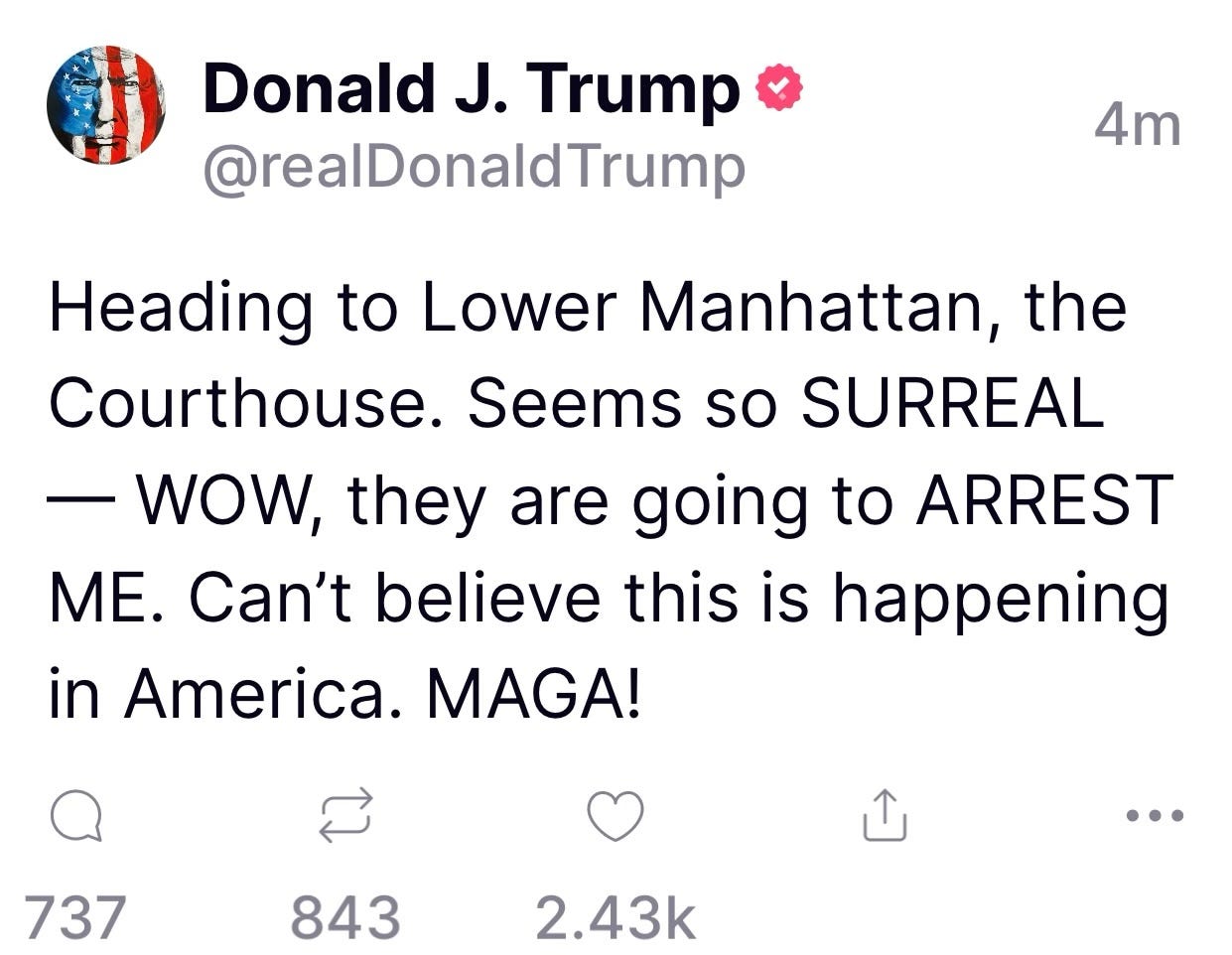
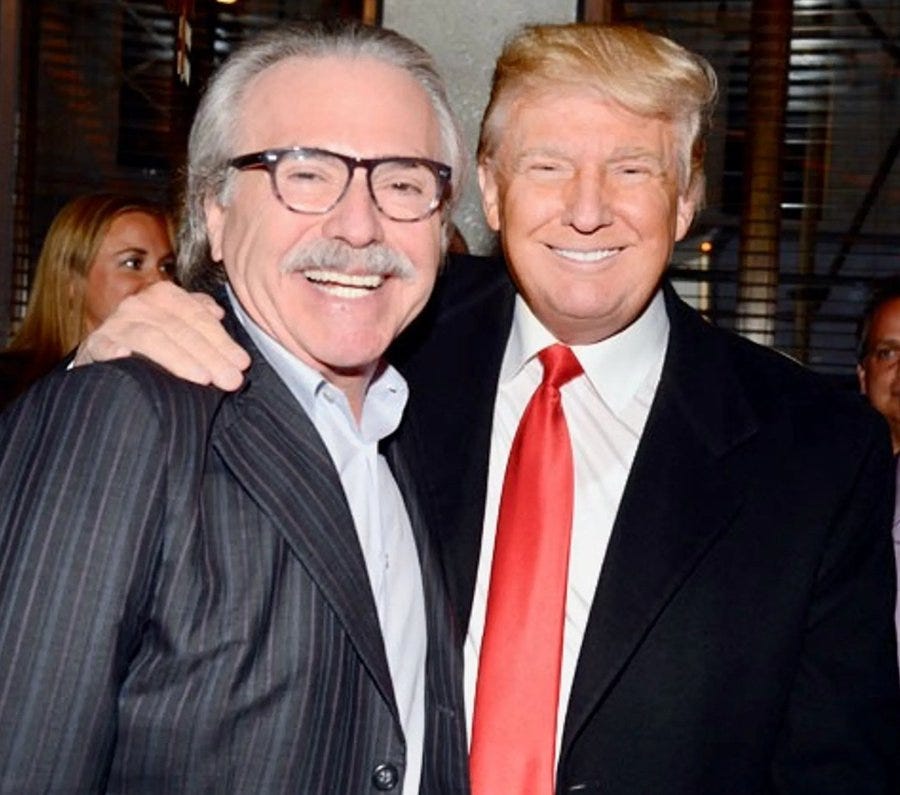
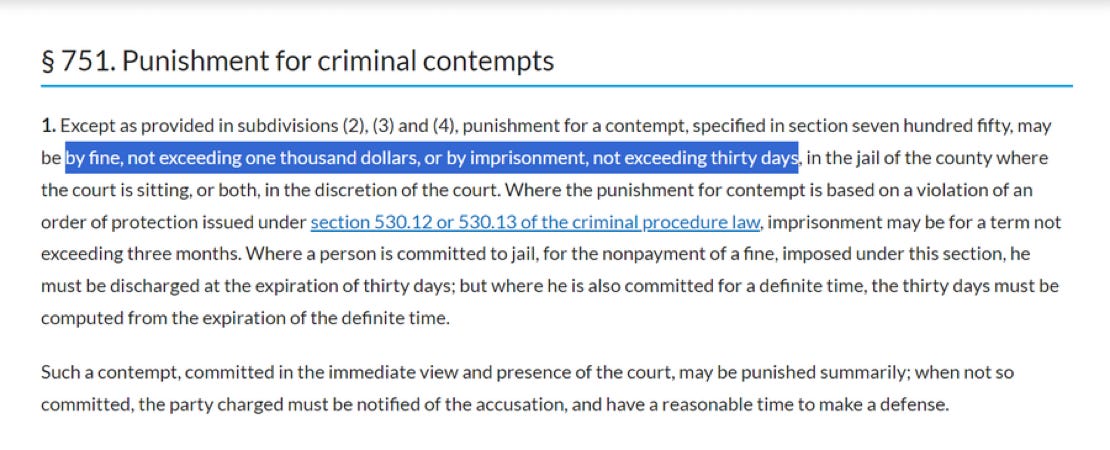
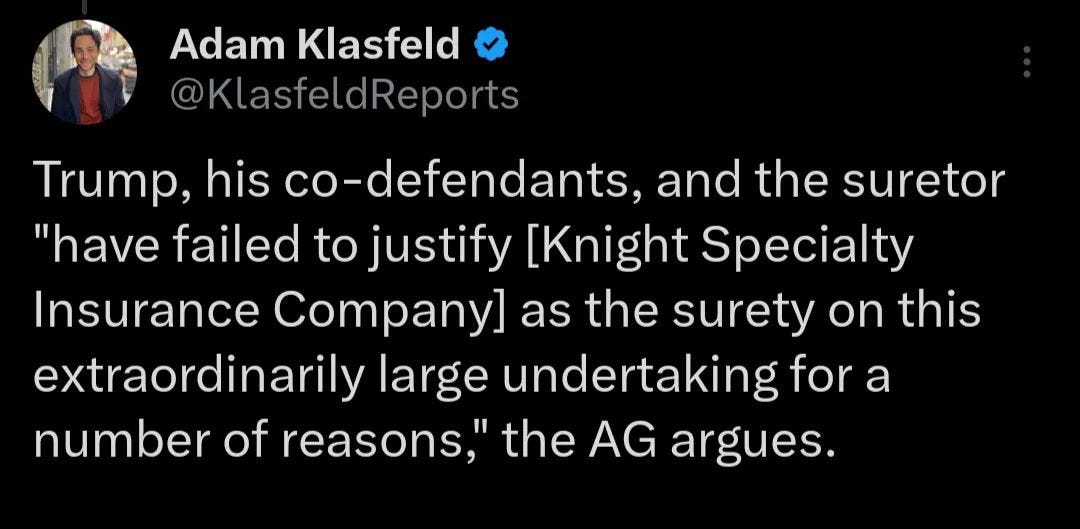
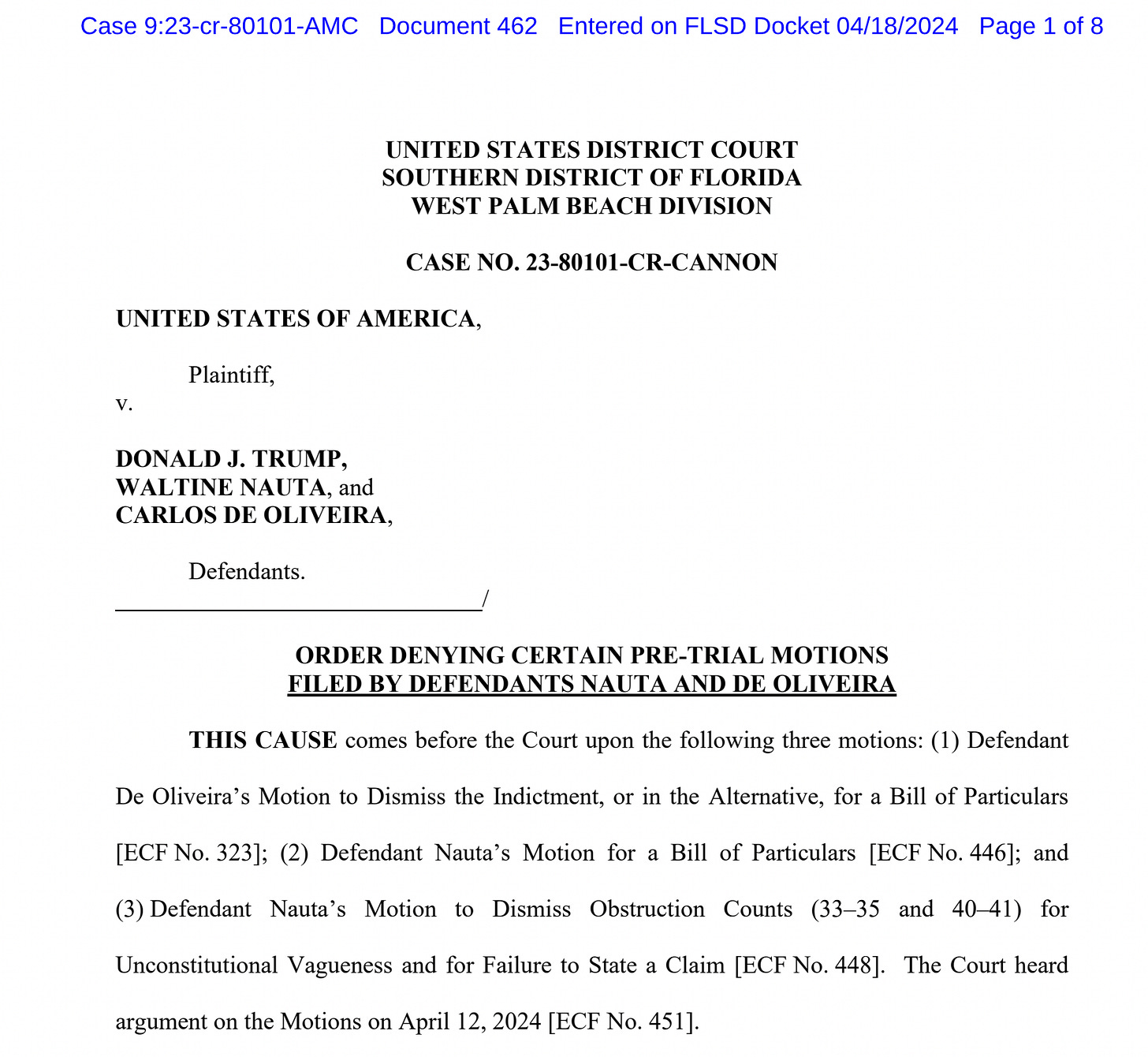
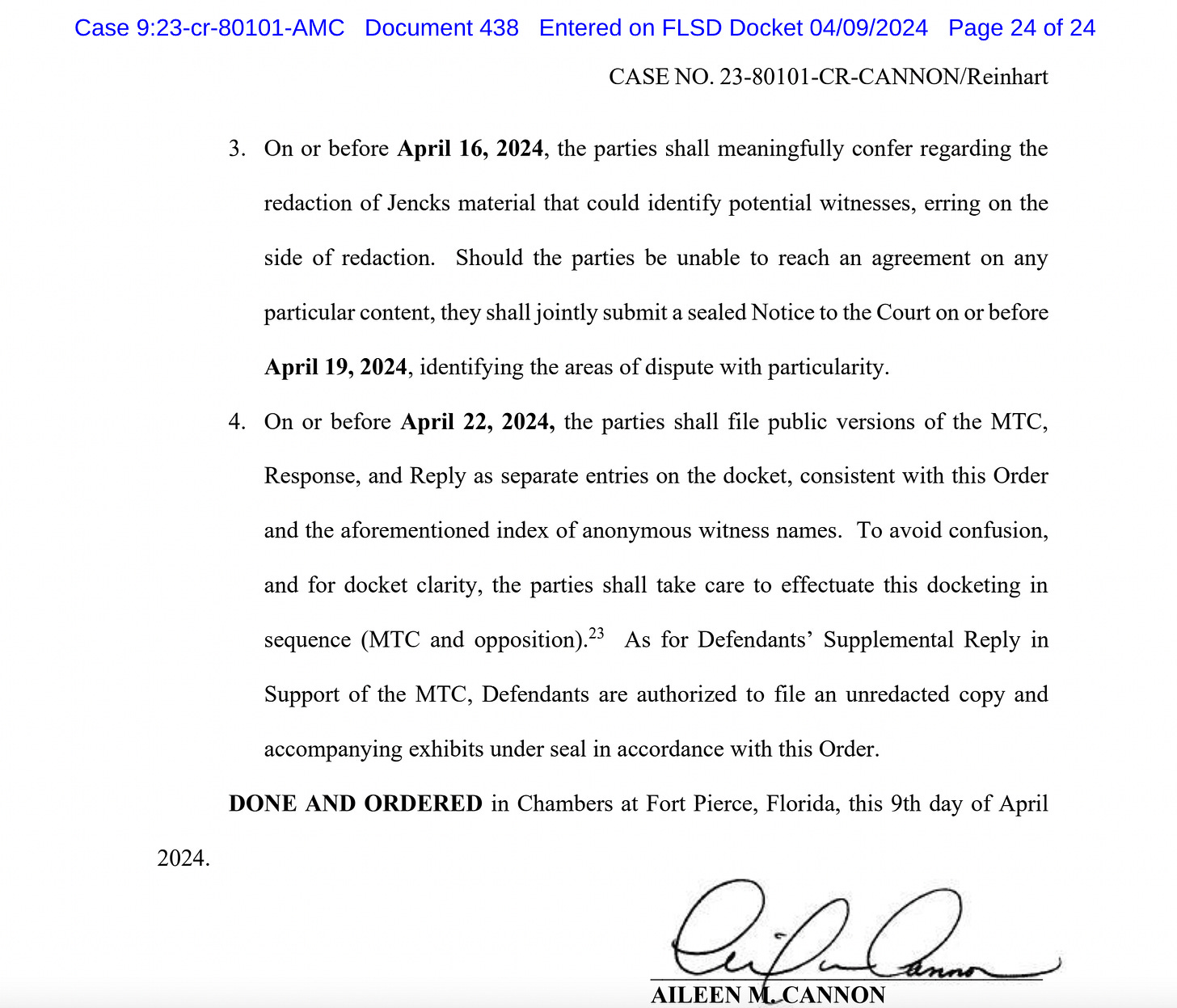
We surely are in this together. Tonight will mark a year since my husband died here at home in Decatur, and we followed every second of every moment of this nightmare together, because we felt it was our responsibility to do so ... and I have missed talking to my pal. But I’m still reading and watching. Let’s see this through.
Wow so much to comprehend this week. I’ll be unavailable Tuesday half the day. I think this was the best comment I saw this weekend on the immunity claim,
“Olbermann also chimed in.
"Still hasn't occurred to Flatulence J. Trump that if Biden has presidential immunity he could arrest and detain without trial, Trump, his family, and every one of his supporters and never face consequences. Oh and cancel the election. You want to play this game, MAGA? You lose."